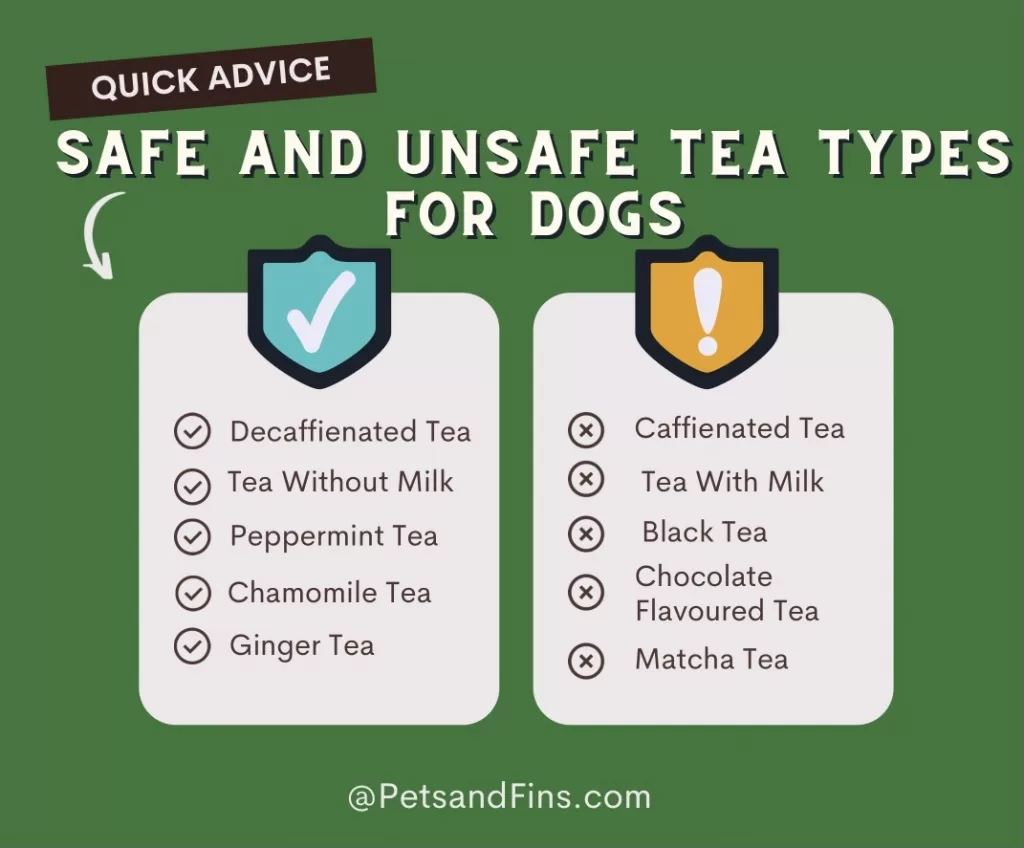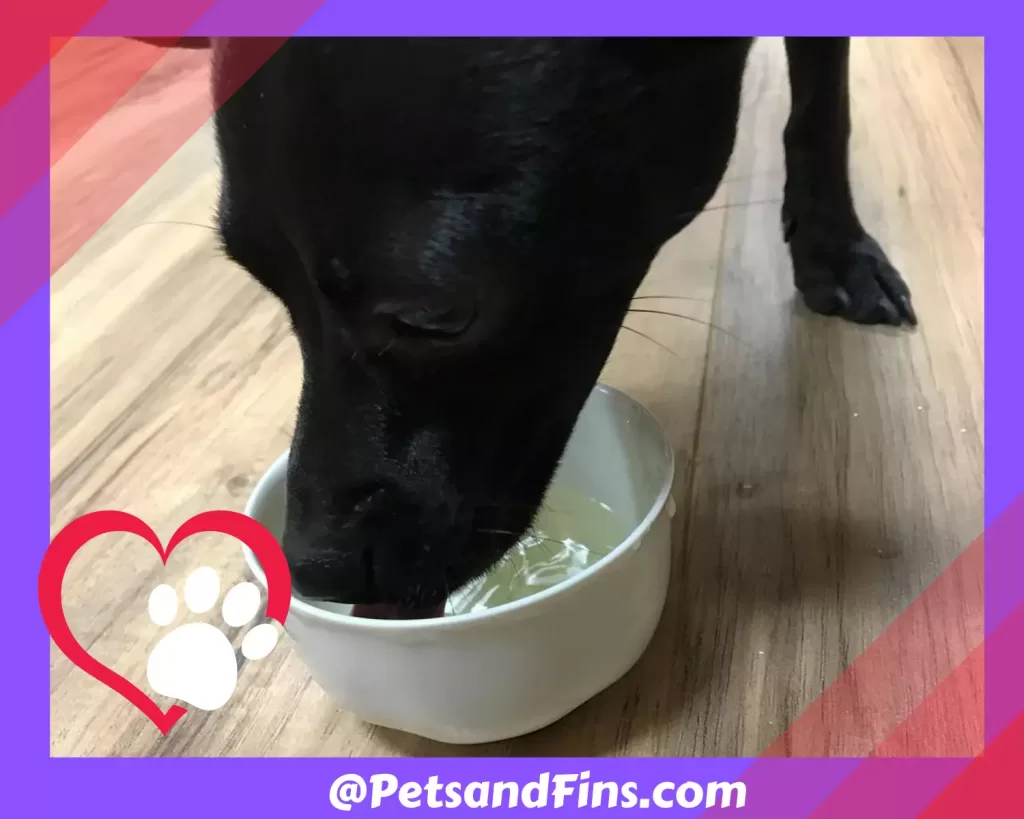Can dogs drink tea? You may be asking yourself this question! There are many benefits to drinking tea for humans, but what about dogs? Dog owners often wonder if it is safe or not.
In this article I will discuss the benefits and side effects of giving your dog a cup of tea. I will also cover whether tea is necessary for dogs and how to feed your dog tea without making them sick. Finally, I will provide some information on which types of tea are safe for your dog. Let’s get going !
Can Dogs Drink Tea?
The answer to this question is Yes, dogs can drink tea in moderation – with a lot of caveats though! Dogs CAN drink tea-but make sure you understand all of its implications BEFORE you decide to give your dog some of this hot beverage.
I read stories on social media every day from dog owners who feed their dogs human tea ( which has a high caffeine content). They say it’s fun to see their dogs all energised and happy! While this may be amusing on some levels, it is extremely dangerous. If you’re a dog owner, it’s important to know that not all types of tea are safe for your furry family member.

Feeding a dog regular human tea is dangerous! In fact, it can be downright deadly since many teas have high levels of caffeine in them. When consumed by animals like dogs, this substance can cause seizures or respiratory arrest, which are life-threatening conditions.
“Caffeine Infused Tea consumption in pets has been linked with a condition that makes swallowing difficult, problems related to kidney function as well as heart rhythm issues.”
Dr.Evans , Spokane Valley VETERINARY clinic
Why is Tea With Caffeine Dangerous For Dogs?
Caffeine is a stimulant and in humans it stimulates the central nervous system. In dogs, caffeine can increase their heart rate, which may put them at risk for arrhythmias or seizures.
Dog owners who are trying to give their pets regular human tea with high levels of caffeine should be aware that they could also be giving them other potentially dangerous substances like tannins, fluoride, oxalates and more!
Caffeine is a stimulant, and while it can be harmless to humans in small doses, when consumed by animals like dogs, its effects are often much more severe.

Dog owners may not realize the impact that caffeine has on their pets because, unlike people who experience an energy boost after drinking tea or coffee, animals react very differently.
The downside of caffeine boost is that while this effect can last a couple hours in humans, it will affect animals like dogs all day long, which means prolonged exposure. This has an increased risk of negative health consequences such as seizures and heart problems.
When caffeinated drinks are consumed by an animal, this substance will irritate the stomach lining and lead to vomiting; it can also cause diarrhea or pancreatitis in some cases if too much tea has been ingested.

Do Most Of Our Teas Have Caffeine?
Not all of our teas have caffeine, but the majority do. You should make sure to check the ingredients of any tea you plan on giving your pet – so that you don’t serve your dog something with high levels of caffeine in it!
Most teas have some level of caffeine, but it varies depending on where they are from and how long they were brewed for – white, or green tea have less caffeine than oolong or matcha varieties.

I have to mention here that some teas do not contain any caffeine at all as they are made using a different process which does not extract it from the leaves!
Quick Tip : It may be a good idea to contact the company who produces your favorite tea and ask about its ingredients if you’re not sure whether or not it would be appropriate for your dog.
In general, veterinarians are against giving pets caffeinated beverages in any form because of these potential risks. Dog owners should realize this as well!
Symptoms Of Caffiene Toxicity In Dogs:

Caffeine toxicity in dogs can present as a variety of symptoms depending on the level and length of exposure.
- Seizures
- Change in heart rate
- Difficulty breathing or swallowing
- Vomiting and/or diarrhea
- Restlessness
- Panting
- Abdominal Pain
If you notice any sudden changes in their behavior like this after giving them tea with high levels of caffeine, then it’s important to bring them to see your veterinarian immediately! It could be life threatening for them.
The vet may recommend intravenous fluids which can help flush out your pet’s system entirely; use activated charcoal to bind with the toxins so they do not get absorbed back into their bloodstreams; and prescribe medications such as phenobarbital for seizures and anti-vomiting drugs when nauseated pets need relief from vomiting episodes.
Quick Tip: Dog owners should be aware that caffeinated beverages can cause increased liver enzyme levels when consumed by their pets for an extended period of time. Keep a look out for signs like vomiting, lethargy, jaundice (a yellowing of the skin), fever, or dark urine. They may need medical care if this occurs.
What Kind Of Tea Is Good For My Dog?
The simple answer to this is that there really isn’t any kind of tea, with caffeine,which can be considered good for your dog.
Dog owners should avoid giving their pets caffeinated drinks in the first place, but if they do, then it’s best to stick with herbal teas like peppermint or chamomile. These will have much lower levels of caffeine than black and regular teas, so you’re probably not going to run into many problems with them unless your pet has a sensitive stomach.

There are some types of tea that have lower levels of caffeine, and these include white or green varieties. These may be a good choice when you want to give your dog something with less risk if consumed in large quantities.
What Are The Benefits Of Non-Caffeinated Tea For Dogs?
Non-caffeinated tea can be a good thing for dogs to drink because it will not lead to any of the above side effects. Dog owners don’t need to worry about potential seizures, heart problems, or other significant illness risks that come with caffeinated beverages!
![Can Dogs Drink Tea? All You Wanted To Know! 7 List of benefits of decag]ffeinsted tea for your dog](https://petsandfins.com/wp-content/uploads/2021/08/922344C8-2A81-4F18-B894-E3B05C4B5ECE-725x1024.webp)
- Antiseptic and Anti Bacterial : It can act as an antiseptic or cleansing agent by killing bacteria, viruses, or fungi that may have made their way into wounds. Dog owners can use it externally on their pets if they suspect any kind of infection or open wound which needs cleaning up.
- Rich In Anti-Oxidants: Non- caffeinated tea also contains a variety of antioxidants which are important for your pet’s health. These may aid in fighting off cancerous cells by protecting the DNA from damage, or they could assist with the prevention of heart disease, stroke, or arthritis.
- Helps in Digestion: They help with digestion: Dog owners can give their pets tea to help soothe an upset stomach or calm them if they are feeling anxious from car travel, nervous about going into surgery etc. Tea can help in any situation like this where they need some level of comfort and relief!
- Relieves Nausea: Tea is also known to alleviate nausea in humans, which means it’s likely it will work on animals as well.
- Helps Dental Hygiene: They promote oral health. A lot of pet parents who feed their dogs tea,often do so because they know the soothing effects will keep their furry friends’ teeth clean and prevent tartar buildup too!
- Helps Regulate Temperature: When you’re giving your pup something warm, then they’ll feel more comfortable and less likely to be shaking or shivering.
- Natural Deodorizer: They’re a natural deodorizer: Dog owners often use tea as an odor eliminator for their pets because it has antimicrobial properties which help break down bacteria that causes bad smells!
Can My Dog Drink Green Tea?
Green tea is one of the types of tea that can be given to your pet without too much worry. You just need to keep in mind that it still has some caffeine, so you should avoid giving your pets large quantities if they are sensitive or have had any health issues in the past with caffeinated beverages.
Quick Tip : To be sure your dog gets all the benefits of drinking a cup of green tea without any health risks associated with getting too much caffeine, always purchase caffein-free versions whenever possible.

The benefits for dogs include being able to help them maintain a healthy weight as well as promote heart and bone health; you’ll also notice an improvement in coat quality when green tea is regularly consumed by your furry friend!
- They’re rich in antioxidants: Antioxidants are important for a pet’s long term health because they protect the cells from damage, decrease inflammation and help prevent diseases like cancer.
- It contains magnesium : Magnesium regulates muscle contractions and this is especially useful when shaking from anxiety or during seizures – anything where muscles need to remain calm and relaxed.
- It has anti-inflammatory properties: If your dog needs relief from something like arthritis, then green tea might help reduce those symptoms;
Dog owners should still be aware though, that their dog may still get some side effects like increased liver enzyme levels and nausea if consumed in large quantities, because green tea also contains tannins, which are known irritants.
Can My Dog Drink Herbal Tea?
The benefits of dogs drinking herbal tea is that, most of them contain no caffeine, which means dog owners can give their pets any type without too much worry. You just need to keep in mind that most herbal tea types will still have tannins, so you should only give a small amount if the pet has a sensitive stomach.
It’s important for dog parents to purchase teas made from organic herbs because those are often healthier and safer options where pesticides/endocrine disruptors are not present.

There are many herbal varieties though that may be safe for consumption by your dog, including rooibos tea, which contains an abundance of antioxidants without the caffeine content.
Dog owners also have chamomile on hand, which has been shown through studies to reduce inflammation from arthritis among other benefits – this one might be worth experimenting with!
Other types include peppermint and ginger too. Though these prove less effective than green tea, you will still notice some improvement in cholesterol levels if consumed regularly.
Can Dogs Drink Tea With Sugar In It?
Dog owners should also be aware that added sugar of any type may not be good for their pets, so they might want to skip adding any to the tea.
Just because there’s no caffeine in the tea, doesn’t mean dogs are safe from the side effects of sugar. Most types of sugar have been shown to have negative impact on dental health and can also lead to other long-term conditions such as diabetes or obesity.

There are many natural options though, which can offer sweetness without all the bad consequences, including honey or agave nectar, both of which contain antioxidants from plants too. These are usually healthier choices, but only when used in moderation. Excessive use of honey is also not recommended.
Many people know that xylitol is toxic to dogs, but did you know it can also be found in some types of tea? Xylitol is a very common artificial sweetener that’s used in many types of tea. It’s important to look out for teas with this ingredient so your dog doesn’t accidentally get fed any.
Can Dogs Drink Tea With Milk ?
It might be tempting to add some milk or cream to the Dog’s tea, but this is one of those cases where dog parents should resist.
Milk can lead to a range of different health problems, like gastrointestinal issues and diarrhea, because it contains lactose, which dogs may not able to break down properly.

Another concern is that milk contains fat, which isn’t always healthy for dogs because it may lead to weight gain. If your dog already has an issue with obesity, then giving him any type of dairy product will only make things worse!
How To Brew Tea For My Dog?
Brewing a dog’s tea is similar to brewing another type of herbal tea, but there are also a few things dog parents need to take into consideration.
It takes about two minutes on high heat to brew loose leaf tea or six minutes with bags. Bring filtered water (or spring) to a boil, then let it cool down enough to pour over the leaves/bags.
Green tea is typically brewed at about 45°C for up to three minutes. Dog owners should check the instructions on their specific green tea bag because they may have different recommendations from this general guideline!

For other types of herbal tea, dog parents can choose how long to brew it by following the directions on that particular brand’s packaging.
It should go without saying that any dog-specific brands will come with instructions on what best suits each animal, so those are always good options as well – if you’re not sure, just check online or ask someone at the store!
Another thing dog parents should be aware of is that dogs stomachs are much smaller than humans, so they might not need as many cups per day, especially if the dog in question has a sensitive stomach.
It may also help to add some water or other liquids before making your cup; this will end up diluting the tea and make it less likely for the pets to have any side effects when drinking it – just remember not to use boiling water because too-hot beverages can cause burns!
How To Get My Dog To Drink Tea?
This is where dog owners can get creative; you might want to add a small amount of honey, some cinnamon or even fresh fruit slices (dog friendly fruits ).
You can first start by dropping a few dog treats into the feeding bowl and letting the dog smell them and eat them up. Next, you can start adding a little bit of the tea that you have prepared into the feeding bowl along with a few dog treats. As time passes, you can reduce the number of dog treats and increase the tea quantity.

It’s important, though, when giving your dog a new type of tea, that you go slowly so he has time to adjust and get used to any changes in tastes or textures.
You might start with just one small cup per day and gradually increase them as needed until your pet seems comfortable consuming more than usual without having side effects like nausea or vomiting – normally this happens after four cups/day max.
If these effects do happen, dog parents should discontinue serving the tea and consider returning to the dog’s original food.
Wrapping Up:
As you can see, it is possible for dogs to drink tea in moderation – so long as they have a clean and healthy diet and the tea is caffeine free. Tea may not be the best beverage choice for your dog all of the time, but if you want them to enjoy one or two cups with their meals from time-to-time, then feel free!
Just make sure that you consult your vet before providing caffeine free tea and follow the general guidelines on whether milk or sugar should be added when preparing dog tea.
If this blog post has given you some ideas about how to add variety to your dog’s diet without compromising on its health, I am happy! I hope these tips will help keep your dog feeling his best throughout life.
XoXo
Genie
Related Links:
Can My Dog Have Almond Butter?
RELATED QUESTIONS:
Can Dogs Drink Tea For An Upset Stomach ?
Yes, dogs can drink non-caffeinated tea. Herbal teas are not only relaxing for humans but also soothing for a dog’s digestive system, and they may be a good thing at any time or emergency situation. Be mindful of how much you give your dog so that he does not get too much.
Should My Dog’s Tea Be Hot?
Dog owners should always make sure to serve their pets tea at a comfortable temperature so that they don’t burn their mouth or throat.
A warm cup of tea is also more effective during the winter months, as it will not allow a high level of caffeine into the drink– unlike hot-brewed tea !
Dog lovers might want to consider serving cold iced tea on those sunny summer days when pets are thirsty for something refreshing and cool.
